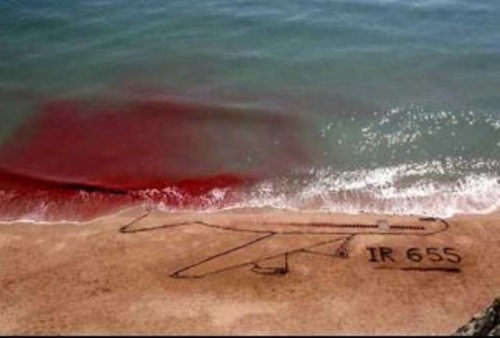 On July 3, 1988, in an unprovoked move, US carrier USS Vincennes fired two missiles at an Iranian passenger plane, Iran Air Flight 655, which was on route to Dubai. All 290 innocent civilians were killed. The United States did not apologize or admit to wrongdoing. Washington has always maintained that the shooting down of the passenger plane was an accident.
On July 3, 1988, in an unprovoked move, US carrier USS Vincennes fired two missiles at an Iranian passenger plane, Iran Air Flight 655, which was on route to Dubai. All 290 innocent civilians were killed. The United States did not apologize or admit to wrongdoing. Washington has always maintained that the shooting down of the passenger plane was an accident.
But was it? The Vincennes' crew, without visual confirmation, fired at the Iranian passenger airliner ‘believing’ it to be an F14 jet fighter descending towards it. The plane was not descending; it was fast ascending. Furthermore, a jet fighter is two-thirds smaller than a passenger plane.
This ‘accident’ came on the heels of another incident in 1987 when a US ship fired its machine guns at a fishing boat from the United Arab Emirates, killing one and injuring three. The fishing boat had been ‘mistaken’ for an Iranian speedboat with ‘hostile’ intent![i]
Addressing the Iran Air flight, David R. Carlson, commander of another U.S. ship in the region (Persian Gulf) stated that the conduct of Iranian military forces in the month preceding the incident was pointedly non-threatening," and the actions of the Vincennes "appeared to be consistently aggressive”. The Vicennes inclination to kill ruthlessly earned it the nickname “Robo Cruiser”[ii]
Not only was there no apology forthcoming, but also the incident would be the start of a string of sky-murders carried out by the United States against Iranian citizens. Thomas Whalen from the aviation law practice of Washington firm Eckert Seamans Cherin and Mellot had argued that sanctions on Iranian carriers are detrimental to airline safety and violate the commitment to airline safety made by the US, Iran and most nations of the world in 1944 when the Chicago Convention was forged.
Immoral and blind to laws, "Robo Cruiser” gave way to Robo Sanctions. 17 planes crashed killing some 1,500 people. Terrorism in the skies had become another tool in Washington’s arsenal.
Encouraged, two experts, Michael B. Kraft, a counterterrorism consultant and Brett Wallace, research coordinator at the International Center for Terrorism Studies, actually endorsed acts of terrorism against Iranians. Writing for the Washington Times in 2007, they argued:
“Most of the current sanctions, however, are relatively invisible except to bankers or the would-be exporter or importer. By contrast, suspending Iran Air’s landing rights and cutting off spare parts and maintenance services would be a very visible and dramatic step to both the Iranian public and the ... [government ].”
A UN Panel on March 17, 2005 describes Terrorism as “any act "intended to cause death or serious bodily harm to civilians or non-combatants with the purpose of intimidating a population or compelling a government or an international organization to do or abstain from doing any act.”
Washington listened. Spare parts were denied. More crashes, more dead civilians.
Today, as Iranians commemorate the downing of Iran Air Flight 655 and mourn the death of 290 civilians, the world must be cognizant of the fact that the United States continues its policy of terrorism. When it comes to mass murder, for Washington, sky is the limit.
Notes
i Ronald O'Rourke, "The Tanker War," Proceedings, U.S. Naval Institute, May 1988, p33
ii Commander David R. Carlson, "The Vicennes Incident," letter, Proceedings, U.S. Naval Institute, Sept. 1989, pp. 87-88.
Source: Press TV
